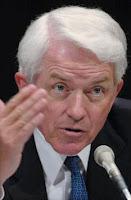
Tom Donohue
The U.S. Supreme Court's decision to uphold most of the Obama health-care law was by far the most-watched story of last week. But a story that might prove to be more important in the long run quietly unfolded in Albany, New York.
It could wind up shining light on organizations and individuals who have befouled the political environment here in Alabama.
Eric T. Schneiderman, the attorney general of New York, launched an investigation of tax-exempt groups that are heavily involved in political campaigns. A case involving the U.S. Chamber of Commerce, and its high-profile director Tom Donohue, is a focal point of the probe. It might also examine groups led by the billionaire Koch brothers and Republican strategist Karl Rove.
What could this mean for Alabama? Well, it's too early to say. But it's a matter of public record that Rove and Business Council of Alabama (BCA) President Bill Canary used financial support from the U.S. Chamber of Commerce to essentially buy state-court seats in our state. That process started in the mid 1990s and turned an all-Democratic bench into a Republican stronghold, one that has been prone to overturn jury verdicts that favor consumers.
It's also a matter of public record that Canary's BCA was linked to the political prosecution of former Alabama Governor Don Siegelman. And one of Canary's lieutenants, Ralph Stacy, died from a mysterious shotgun blast at BCA headquarters. Stacy's death has been ruled a suicide, but the details of any investigation have gone largely unreported in the mainstream Montgomery press.
We already have asked this question: Did the U.S. Chamber of Commerce play a role in Ralph Stacy's death? Should the New York investigation wind up spreading to Alabama . . . well, there is no telling what ugliness might be found. For now, here is how The New York Times describes the focus of Schneiderman's probe:
Mr. Schneiderman issued a wide-ranging subpoena on Tuesday to executives at a foundation affiliated with the chamber, seeking e-mails, bank records and other documents to determine whether the foundation illegally funneled $18 million to the chamber for political and lobbying activities, according to people with knowledge of the investigation.
The investigation is also looking at connections between the chamber’s foundation, the National Chamber Foundation, and another philanthropy, the Starr Foundation, which made large grants to the chamber foundation in 2003 and 2004. During the same period, the National Chamber Foundation lent the chamber $18 million, most of it for what was described as a capital campaign.
What are the possible implicationns of the New York investigation? The Times spells it out:
Mr. Schneiderman’s investigation is the first significant one in years into the rapidly growing use of tax-exempt groups to move money into politics. The biggest such groups, including Americans for Prosperity, which is backed by the billionaire brothers Charles and David Koch, and Crossroads Grassroots Policy Strategies, which was founded by Karl Rove and other Republican strategists, are expected to spend hundreds of millions of dollars this year on issue advertisements against candidates to sway the outcome of the presidential and Congressional elections.
But the sources of that money are largely obscured from public view by mazes of transactions between allied groups and laws that allow tax-exempt organizations — unlike candidates and “super PACs” — to shield their donors.
Calls from Democrats and ethics watchdogs for tighter oversight of the groups’ political activities have resulted in little action by either the Federal Election Commission, which is deadlocked over the issue, or the Internal Revenue Service, which regulates charities at the federal level. But the subpoena from Mr. Schneiderman, a Democrat who made tougher campaign finance laws a centerpiece of his 2010 election campaign, suggests that he — like his predecessors Eliot Spitzer and Andrew M. Cuomo — is preparing to aggressively exploit the unusually broad regulatory powers of his office to vault onto the national stage.
Could this wind up being a case of "Eliot Spitzer's Revenge"? The former attorney general and governor of New York appeared to be on the verge of busting AIG in early 2008 when he was brought down by his own prostitution-related scandal. AIG went on to play a major role in the U.S. financial meltdown that preceeded the 2008 presidential election. Schneiderman's investigation has a strong AIG flavor. Reports The Times:
The Starr Foundation is one of the country’s largest philanthropies, with total assets of about $1.3 billion. Named after Cornelius Vander Starr, the founder of American International Group, the foundation is headed by Maurice R. Greenberg, who was AIG’s chairman until being forced out in 2005. As AIG chairman, Mr. Greenberg also served on the board of the Chamber of Commerce and was a vocal advocate of legislation limiting class action lawsuits.
The National Chamber Foundation has not confirmed that the Starr Foundation grants paid for its loan to the chamber. But the chamber foundation’s tax returns suggest that the loan would not have been possible without the Starr grants, which totaled roughly $19 million.
The so-called "tort reform" movement has been shoved down the throats of middle-class Americans, largely with the help of AIG, the U.S. Chamber, and Karl Rove. Southern states, such as Alabama and Mississippi, have been key battlegrounds in the effort to elect corporate-friendly judges. As a result, our state courts have become grotesquely corrupt, with simple procedural and statutory law misapplied--and clear case law ignored.
What kind of financial chicanery was driving that train? Perhaps Schneiderman will helps us find out.
